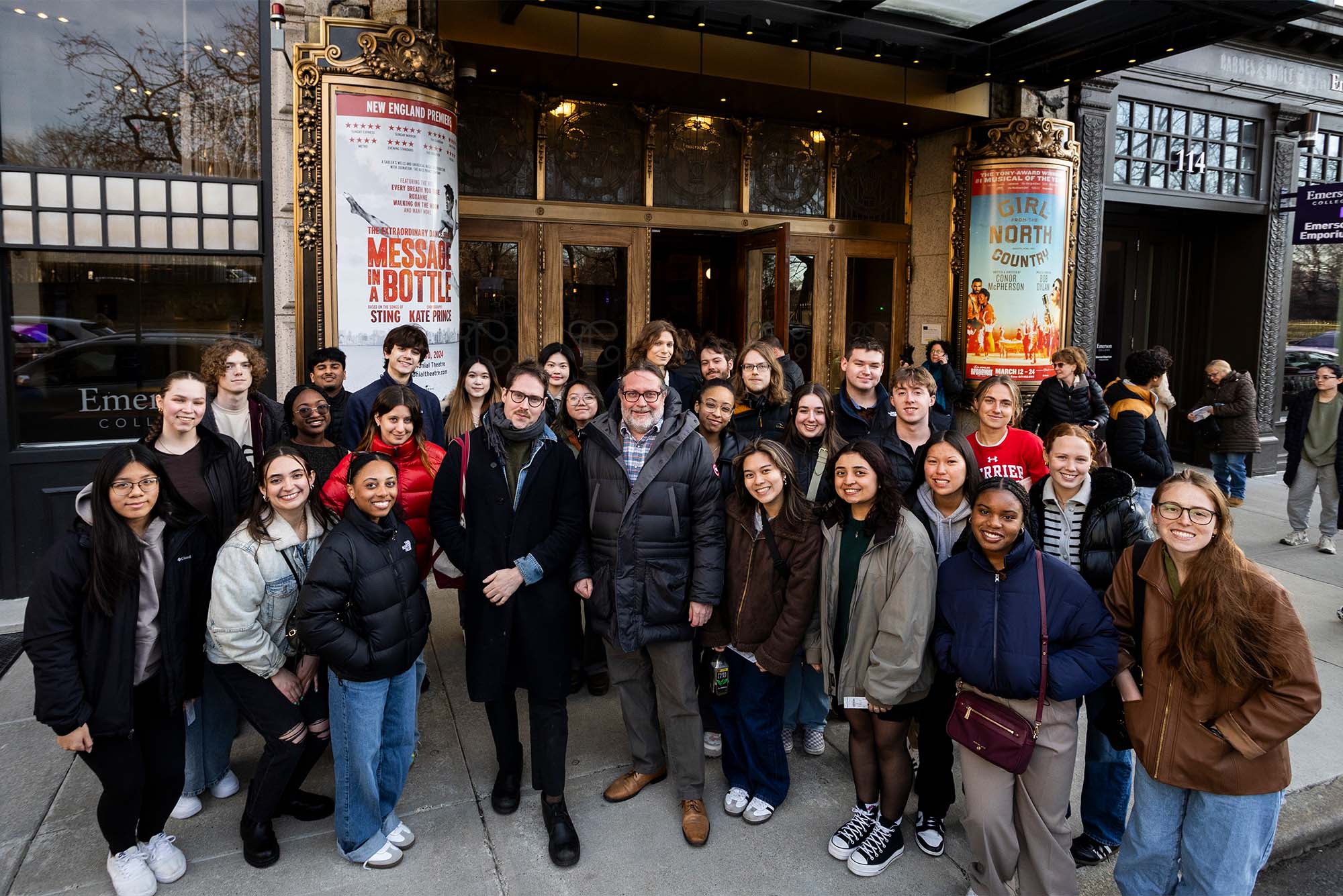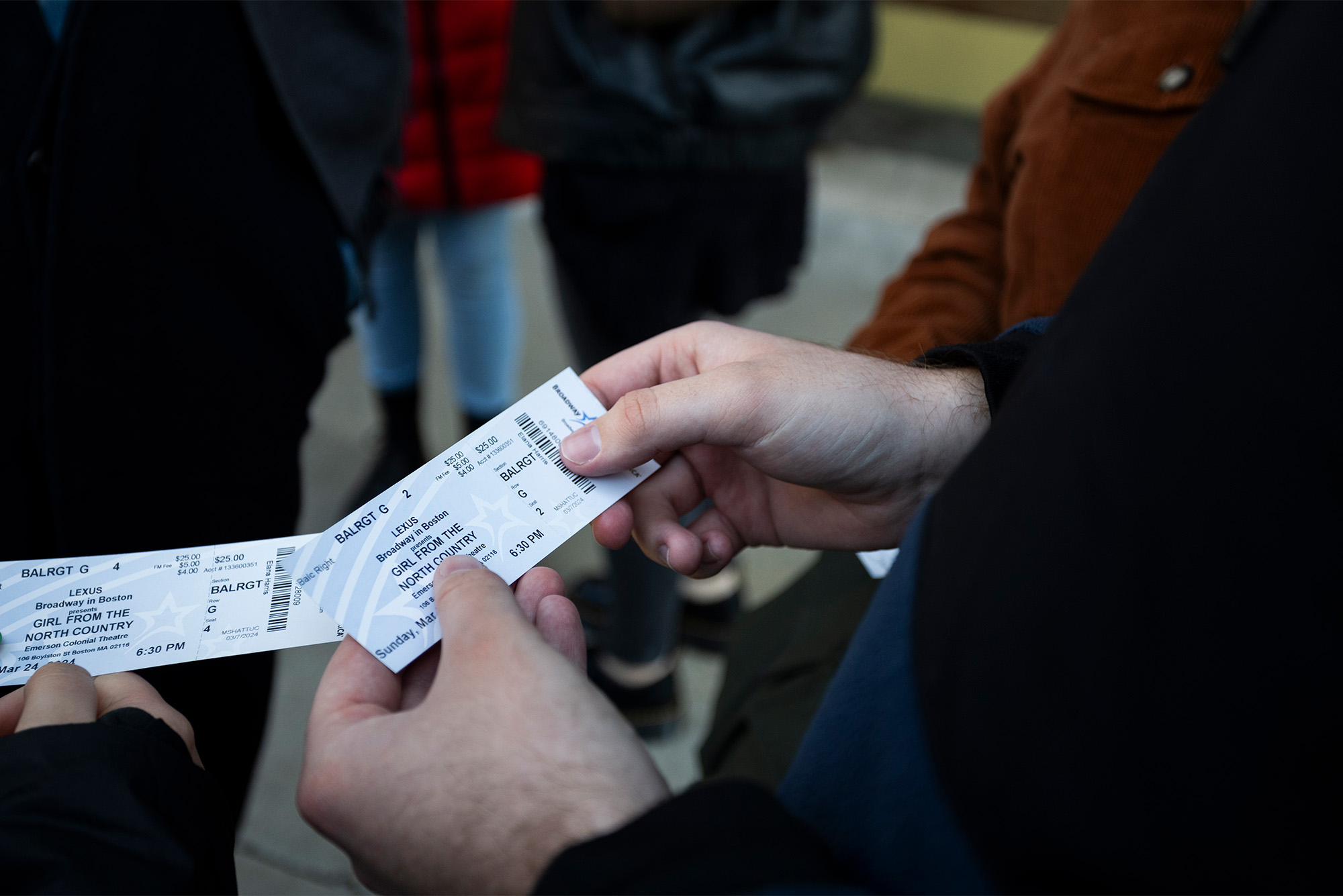All of Boston’s a Stage

Chase Culler (center left) and Kevin Barents (center right) each teach a section of The Theater Now, a CAS Writing Program course that takes students to local theater productions. This semester, they’ve seen Hairspray and The Girl from the North Country.
All of Boston’s a Stage
The immersive BU Writing Program course The Theater Now brings students to local stage productions
Brandy Barents and Kevin Barents can’t remember how they got into theater—the love was always there. A lecturer and a master lecturer in the College of Arts & Sciences Writing Program, they fell for each other in high school when they were cast in an Edward Albee play and have been together ever since. Both studied English in college, but Kevin Barents, who joined the Writing Program faculty in 2005, says they spent more time acting in plays than reading books.
“People who are passionate about theater tend to be quite passionate about theater,” he says. “It’s one of those universal human experiences that everybody can connect with on some level.”
Simply put, the two are theater people. These days, the husband-and-wife duo co-teach the Writing Program course WR153: The Theater Now.
Each year since the course began in 2012, its faculty devise a new syllabus, corresponding with theatrical productions playing in Boston during the semesters. With funds from the BU Arts Initiative, students go to two shows each semester and complete projects and critiques based on what they see.
According to Brandy Barents, who has taught in the Writing Program since 2007, getting students out into the city, where they can engage with the broader arts community, is key. Attending the theater in order to fulfill the course requirement forces them to see for themselves the important role theater plays in the city’s ecosystem. “It’s exciting to get to meet directors, actors, and people creating art,” she says. “It’s what makes [the course] worthwhile.”
The Theater Now was created in 2012 by Anthony Wallace, a Writing Program senior lecturer, and William Marx, a College of Communication master lecturer, who codirected the course until Wallace’s death in 2018. Brandy Barents took over in May 2019, and Kevin Barents joined her a year later.
“When Tony and Bill started this, I always thought it was so cool and I always wanted to get in on it,” Brandy Barents recalls. “It was amazing that they created this whole course and that it was so popular.”
When the faculty sit down to plan the course, they build every assignment, and the semester’s timeline, around the Boston theater production calendar. Sometimes they’ll see shows at Cambridge’s American Repertory Theater. Other times, it’s a touring show that’s visiting the city. The most important assignments each semester are to write theatrical reviews of the productions they attend, and to create a proposed film based on an adapted Broadway musical. This includes a pitch, a poster, a film trailer, and a final presentation that touches on the semester’s themes.

The current semester is focused on musicals. Students first saw Hairspray at Boston’s Emerson Colonial Theater, and after March spring break, they went back to the Colonial for the national tour of The Girl from the North Country, a jukebox musical featuring the songs of Bob Dylan.
Chase Culler, a lecturer in the Writing Program, is teaching a section of The Theater Now for the first time this semester. He met his students just a day before seeing Hairspray with them. Kevin Barents didn’t have even that luxury—the first time he heard their voices was while handing out tickets in front of the theater.
“It made me wonder how quickly a class could gel if we just immediately threw them into [the theater],” Culler says.
Pretty quickly, it turns out. Brandy Barents notes that the students have forged a strong community within the course; she is proud that they enjoy the work and that the classroom is a comfortable space for them to have critical discussions. Topics have ranged from social justice movements to queer films to protest songs.
“I enjoy that the discussions are free-roaming around the class,” says Artem Vazetdinov (COM’27), a student in one of Culler’s course sections. “Literally all class members participate.”
Brandy Barents and Kevin Barents and Culler hope that students will gain a greater appreciation for theater through taking the course, in addition to strengthening their writing skills. In a day and age where it can sometimes feel like everything has been written, Brandy Barents aims to get students to see that theater is all about creation and forging community, whether it’s “a small town production where nobody’s getting paid or Broadway, where you see amazing things happening.”
“Theater is supposed to be fun,” she says. “It’s supposed to make you think, but it should also be enjoyable. Anytime you can mix those two—make class fun and really enjoy something that you’re studying—you have so much more of a chance to learn.”
Comments & Discussion
Boston University moderates comments to facilitate an informed, substantive, civil conversation. Abusive, profane, self-promotional, misleading, incoherent or off-topic comments will be rejected. Moderators are staffed during regular business hours (EST) and can only accept comments written in English. Statistics or facts must include a citation or a link to the citation.